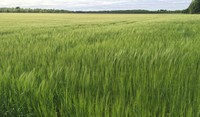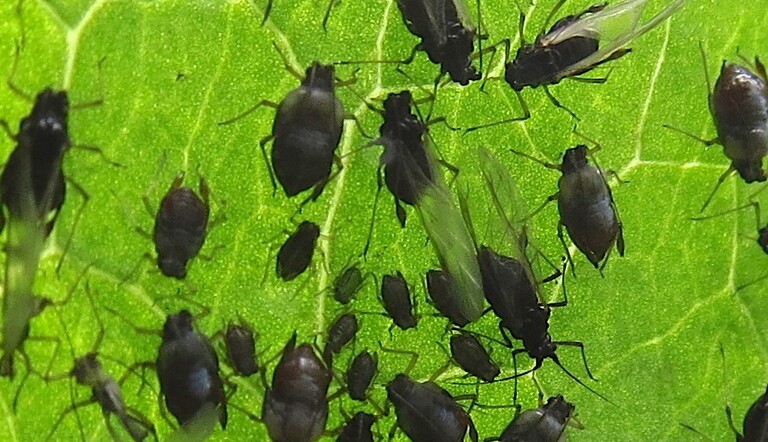
MAVRIK®: the safer way to control grain aphids

The Rothamsted insect survey: https://www.rothamsted.ac.uk/national-capability/the-insect-survey
As soon as grain aphids have been detected on at least 50% of the crop’s tillers, growers should apply a suitable pesticide, and preferably one with a lower impact on beneficial insects such as ground and rove beetles, hoverflies, lacewings, ladybirds and parasitic wasps and flies, all of which feed on and can therefore help to control pest populations.
In situations where a pyrethroid pesticide is deemed necessary, MAVRIK® (240 g/litre tau-fluvalinate) not only provides fast-acting contact control of aphids, but has also been proven to have a lower residual impact on beneficial insects compared to other pyrethroids.
Compared to other pyrethroid pesticides, MAVRIK® has a less detrimental effect on beneficial insects after a few days.
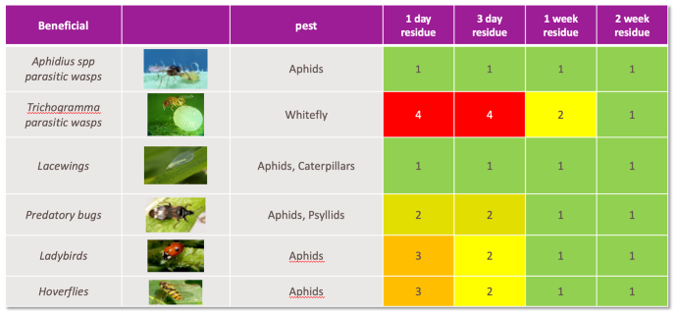
IOBC classification: 1 = harmless, 2 = slightly toxic, 3 = moderately toxic, 4 = harmful.
Source: IPM IMPACT. Dose rate: 0.2l/ha
This reduced toxicity enables advantageous insects to recover more quickly after crops have been sprayed, therefore ensuring there’s a strong population of natural predators ready and able to contribute to the control of any subsequent influxes of aphids.
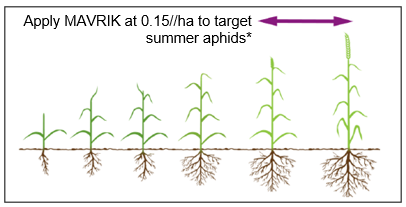
* For summer aphid control in cereal crops, spray once when aphids are present on two-thirds of ears and increasing in numbers.
Better protection when the mercury rises
MAVRIK has the added advantage of being very fast acting which means it halts feeding damage quickly. It also remains more stable at high temperatures compared to alternative insecticides, with work carried out at BTL Bio-Test Labor Gmbh Sagerheide in Germany showing that temperatures above 15oC reduced the efficacy of lambda cyhalothrin CS formulation against Grain aphids. Meanwhile, aphid knockdown and the persistence of MAVRIK continued to be robust at 20 and 25oC, which makes it the more effective option if and when the mercury finally starts to rise.

Controlled temperature work found Mavrik (green lines) to be more effective against grain aphids compared to lambda cyhalothin (red lines) at all temperatures from 15oC upwards.
Source: T.Thieme, 2017 (BTL Bio-Test Labor Gmbh Sagerheide, Germany)
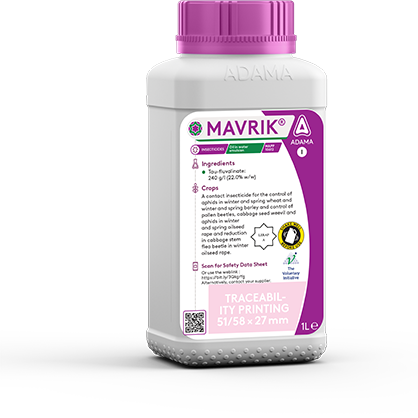
MAVRIK (240 g/litre tau-fluvalinate) is a highly active and novel pyrethroid which has less impact on beneficial organisms such as honeybees compared to other pyrethroid insecticides. It provides effective, fast-acting contact control of aphids, pollen beetle and cabbage seed weevil.
APHOX – the fast-acting aphicide for beans and peas
The arrival of summer also means beans and peas will need to be protected from the rapid influx of aphids which has already started. Growers of seed crops or crops destined for a high value market should be especially prepared to protect against the risk of aphid-borne viruses.
Containing 500g/kg of pirimicarb, APHOX is a fast-acting aphicide approved for use in field beans, broad beans, vining peas and combining peas. APHOX has a curative action, so application can be delayed a little, especially as it delivers systemic and vapour action which adds to its efficacy. And, although it provides rapid knock-down of pests such as black bean aphids (Aphis fabae) it still possesses a favourable profile on bees and many other important beneficial insects.

Black bean aphids.
APHOX should be applied as soon as the treatment threshold of 10% of plants infested has been reached, but apply very early or late in the day to avoid coinciding with when bees and other beneficials are actively foraging.
Although not essential, the efficacy of APHOX will be improved when it is applied in conjunction with an adjuvant (preferably one which is surfactant based). It is also preferable to use a large water volume (a minimum of 200l/ha is required) and to avoid spraying in hot conditions: temperatures higher than 21oC will reduce efficacy, and spraying operations should be halted if temperatures exceed 25oC.


APHOX (500g/kg pirimicarb) is a fast-acting aphicide for beans and peas. With systemic and vapour action, it provides rapid aphid knock-down, but is favourable against bees and many other beneficial insects which enables these natural aphid predators to recolonize quickly after application.


